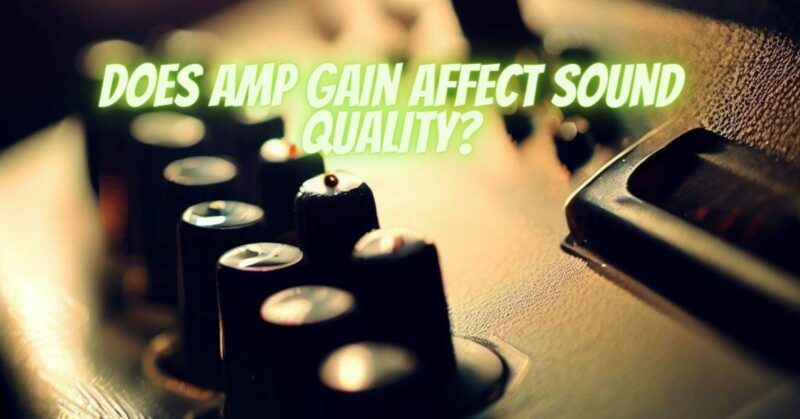In the world of guitar amplifiers, the term “gain” often conjures thoughts of distortion, crunch, and powerful rock tones. However, there is a common misconception that increasing amp gain necessarily degrades sound quality. In this article, we will explore the relationship between amp gain and sound quality to clarify how it impacts your overall tone and playing experience.
Understanding Amp Gain
Amp gain, often referred to as “distortion” or “overdrive,” is the degree to which an amplifier amplifies the input signal beyond its original level. It’s what gives electric guitars their iconic crunch, sustain, and distortion. Gain can be controlled on amplifiers through a dedicated gain or drive knob, and it plays a pivotal role in shaping your guitar’s tone.
The Gain-Sound Quality Connection
The idea that increasing amp gain automatically diminishes sound quality is a misconception. In reality, the relationship between gain and sound quality is nuanced and depends on several factors:
- Tonal Goals: The perception of sound quality is highly subjective and varies from player to player. Some musicians desire pristine, crystal-clear tones, while others crave the gritty, saturated sounds of distortion. The “best” sound quality depends on your tonal goals.
- Amp Quality: The quality of your amplifier plays a significant role. High-quality amplifiers are designed to maintain sound quality even at high gain levels. Cheaper or poorly constructed amps may exhibit tonal degradation more noticeably.
- Volume Levels: Playing at extreme volume levels can introduce unwanted artifacts and distortion that might be mistaken for a decline in sound quality. It’s essential to balance gain and volume to achieve your desired tone without pushing the amp to its limits.
- Speaker and Cabinet Selection: The choice of speaker and cabinet can influence sound quality at high gain settings. Some combinations are better suited for handling distortion and maintaining clarity.
- Pedals and Effects: The use of distortion and overdrive pedals can also impact sound quality. High-quality pedals are designed to shape your tone effectively without degrading it.
- Playing Technique: Your playing technique and articulation can greatly affect perceived sound quality. Skillful playing can make even heavily distorted tones sound articulate and musical.
Finding the Right Balance
Instead of viewing gain as something that inherently harms sound quality, consider it a tool for achieving your desired tonal characteristics. The key is to find the right balance:
- Experimentation: Explore the full range of your amplifier’s gain control. Experiment with different gain settings to discover the tones that align with your musical style and preferences.
- Amp Selection: Invest in a high-quality amp that can handle increased gain without sacrificing sound quality. Read reviews, try out different amps, and consult with experts to find the right fit for your needs.
- Volume Management: Be mindful of volume levels. Playing at extreme volumes can introduce unwanted distortion and affect perceived sound quality. Adjust the master volume to a comfortable level that suits your environment.
- Pedals and Effects: Utilize pedals and effects to shape your tone effectively. High-quality distortion and overdrive pedals can help you achieve the desired level of gain without compromising sound quality.
Amp gain is a versatile tool that can enhance your playing experience by providing a wide range of tonal options. It does not inherently degrade sound quality, but the way it affects your tone depends on various factors, including your amp’s quality, volume levels, speaker selection, and playing technique.
Ultimately, the perception of sound quality is highly subjective, and what matters most is achieving the tone that aligns with your musical goals. By understanding how to balance gain effectively and selecting the right equipment, you can harness the power of amp gain to shape your unique sound and express your musical creativity.


